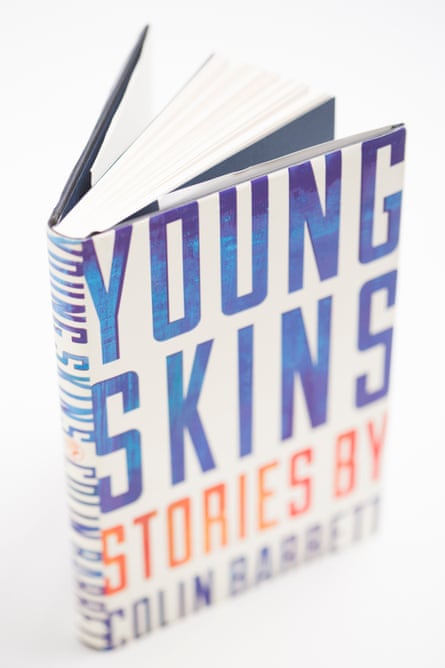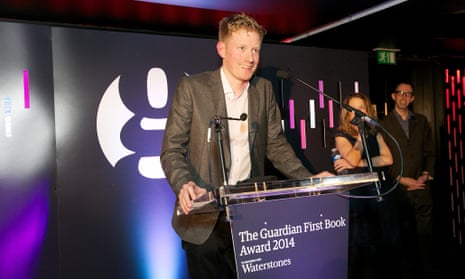The Irish writer Colin Barrett has won the 2014 Guardian first book award with a lyrical collection of short stories, Young Skins.
Born in 1982, Barrett grew up in County Mayo and worked for a mobile phone company in Dublin before returning to college to study creative writing. His stories began appearing in the Irish literary journal The Stinging Fly in 2009, with the magazine bringing out a collection four years later as Barrett signed with Jonathan Cape in the UK and Grove in the US.
The collection is set for the most part in the fictional town of Glanbeigh, a nowheresville hard by the “gnarled jawbone” of Ireland’s Atlantic coastline with a roundabout, an industrial estate, a five-screen Cineplex and “a century of pubs packed inside the square mile of the town’s limits”. A cast of petrol pump attendants, recovering addicts, drug dealers and bouncers weaves around this constricted world from night club to fast-foodery, from river bank to concrete picnic area, the city far enough away that it might well as be on the moon. Violence hangs in the air – violence which can be swerved, or pushed aside to offer some unexpected transcendence, but is always there, hovering like the “thickets and thickets” of midges in the evening.
Writing in Guardian Review, Barrett said the collection was full of the “usual things that transpire within the confines of any small town … misjudgments and violence, affairs and kindnesses, silences and eruptions”.
“I grew up in a town like this, knew people infused with the same peculiar sensibility as this cast of characters,” Barrett wrote, “but do not let me mislead you by implying I have any authoritative judgment to deliver on this world. What fascinated me as I worked on these stories and incrementally built the world of Glanbeigh was how little I truly understood the people and places of this town.” Art thrives on such combinations of intimacy and mystery, he continued, “and so I resolved to draw the characters as meticulously and vividly as I could, but to simultaneously preserve the integrity of their essential unknowability.”

It is the intensity of the short story which attracts him, Barrett wrote, citing Anne Enright’s description of John McGahern’s stories as the “literary equivalent of a hand grenade rolled across the kitchen floor”. In some of his stories the explosion is yet to come, while others explore the “ringing aftermath”, but “that is what I wanted these stories to be infused with: the pure combustibility of being alive”.
According to Enright, one of the judges on this year’s first book award panel, what brings a panel to a consensus in such a diverse prize is “always the quality of the writing, how it moves on the page. You’re also looking for an author who has a clear path in front of them, who can go the distance.”
Young Skins is “from line to line … as interesting as prose can get these days,” Enright continued. “You expect everything to go horribly wrong in these stories, but they move towards redemption and not disaster. Barrett is very good at the unexpected. You’re working through something that’s feels gritty and hard but by the end, each story has turned into something almost lyrical and open. That’s real writing.”
The Booker winner places Barrett as part of a new generation of Irish writers such as Eimear McBride, Claire Kilroy and last year’s first book award winner, Donal Ryan. “There’s a sense of excitement in the air. It’s like the 80s, all over again.”

Surrounded by the blizzard of words on the internet, readers are looking for “something a little more difficult”, Enright continued. “They don’t want fluff, they want something real and Barrett’s a real writer – there’s no doubt about that.”
Chair of judges, Guardian Review editor Lisa Allardice, added: “Colin Barrett has already been hailed as a ‘new, young genius’ – and you can’t get much better than that. It was a particularly strong shortlist and each of the titles was ardently debated, but in the end we had to go with the book that, in the words of one of the judges, was ‘simply the best written’ – and it is true that Barrett barely hits a false note throughout the collection.”
Enright was joined on the panel for the £10,000 award by the classicist Mary Beard, the shadow secretary of state for education Tristram Hunt and the psychoanalyst and literary theorist Josh Cohen. Young Skins has already won plaudits, taking the 2014 Frank O’Connor short story award as well as the Rooney prize for fiction.
The Guardian first book award celebrates the best literary debuts in any genre. Barrett adds his name to a list of winners including Zadie Smith, Robert Macfarlane, Chris Ware and Yiyun Li.






Comments (…)
Sign in or create your Guardian account to join the discussion